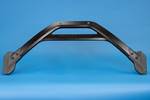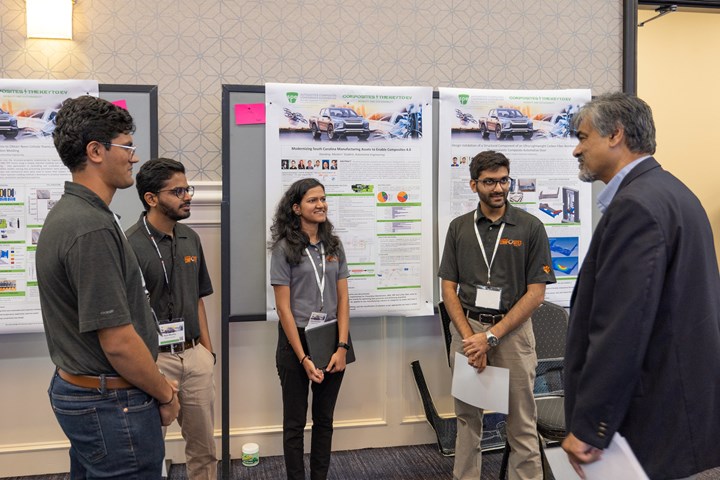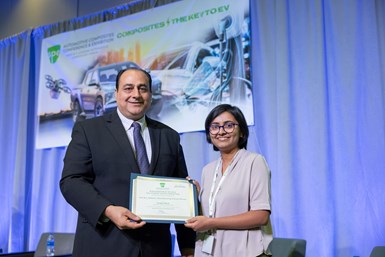Submit abstracts to SPE ACCE 2023 student poster competition
Graduate, undergraduate, community college and high school students are invited to submit poster titles and abstracts on innovative composites technologies by July 1, 2023.
Dr. Uday Vaidya with ACCE 2022 Student Poster Competition students. Photo Credit, all images: SPE ACCE
The organizing committee for the Society of Plastics Engineers (SPE) Automotive Composites Conference & Exhibition (ACCE, Troy, Mich., U.S.) is now inviting graduate, undergraduate, community college and high school students to submit abstracts on innovative composites technologies, for automotive and ground transportation, for its annual student poster competition. The competition will be held during the ACCE at the Suburban Collection Showplace in Novi, Michigan, from Sept. 6-8, 2023.
Judges who are industry experts, SPE board members and members of the media, will review all posters with student authors on the first day of the conference, Sept. 6, 2023. First-, second-, and third-place awards will be presented to winners in graduate, undergraduate and high school categories during a special ceremony during the ACCE.
Poster titles and abstracts are due by July 1, 2023. Digital copies of posters are due by Aug. 20, 2023 for pre-review by judges. Abstracts and digital copies of the posters must be submitted online via the “SUBMIT 2023 ABSTRACTS/PAPERS OR PRESENTATIONS HERE” button on the ACCE conference website. Questions should be sent to ACCEpapers@SPEautomotive.com.
Keith Nagara, Dassault Systemes (Student Poster Competition sponsor), presented an award to Sanjita Wasti, University of Tennessee first place winner, in the PhD “Design, Modeling & Simulation” category last year.
Students will need to bring 24 × 36 inch printed copies of their posters to the conference. Large multi-poster panels and push pins for displaying the posters in the Student Poster Display area will be provided. The poster template is online here.
Moreover, all students presenting a poster in the competition will receive free registration to the conference, a shared hotel room provided by SPE ACCE and one year of free student membership in SPE. The ACCE seeks to provides students with excellent networking opportunities especially ideal for those close to graduating who are starting to look for a job.
Poster topics may include, but are not limited to, subjects such as:
- Automotive composites
- Composites and lightweight materials for trucks
- Biocomposites
- Nanocomposites
- Glass, carbon and hybrid fibers
- Thermoset and thermoplastic technologies
- Recycling and green technologies
- Multi-materials
- Joining technologies
- Applications of composites in electric vehicles
- Modeling and analysis of lightweight materials
- CAFE standards and mandates
- Cost-effective manufacturing
- Use of advanced materials in innovative applications
- Virtual prototyping and design
- Microstructure, failure and fracture
- Failure envelopes and theories
- Additive manufacturing of composites
- Air mobility
Students and their posters are ranked using the following criteria:
- Content (student and poster demonstrate clarity of topic, objectives and background);
- Motivation for research and technical relevance to conference theme;
- Methodology and approach to problem;
- Quality of proposed research results/findings;
- Conclusions are supported by information presented;
- Presentation (display aesthetics are pleasing and there is a logical flow between sections);
- Knowledgeable (presenter has a good grasp of the subject);
- Understandability (poster is effective even without student being present to explain it); and
- Overall rank versus other posters and presenters.
For additional information about the SPE ACCE 2023 event, including the innovative parts competition, keynotes, scholarships and other more general information, visit this link.
Related Content
-
SMC composites progress BinC solar electric vehicles
In an interview with one of Aptera’s co-founders, CW sheds light on the inspiration behind the crowd-funded solar electric vehicle, its body in carbon (BinC) and how composite materials are playing a role in its design.
-
Automotive chassis components lighten up with composites
Composite and hybrid components reduce mass, increase functionality on electric and conventional passenger vehicles.
-
Infinite Composites: Type V tanks for space, hydrogen, automotive and more
After a decade of proving its linerless, weight-saving composite tanks with NASA and more than 30 aerospace companies, this CryoSphere pioneer is scaling for growth in commercial space and sustainable transportation on Earth.















